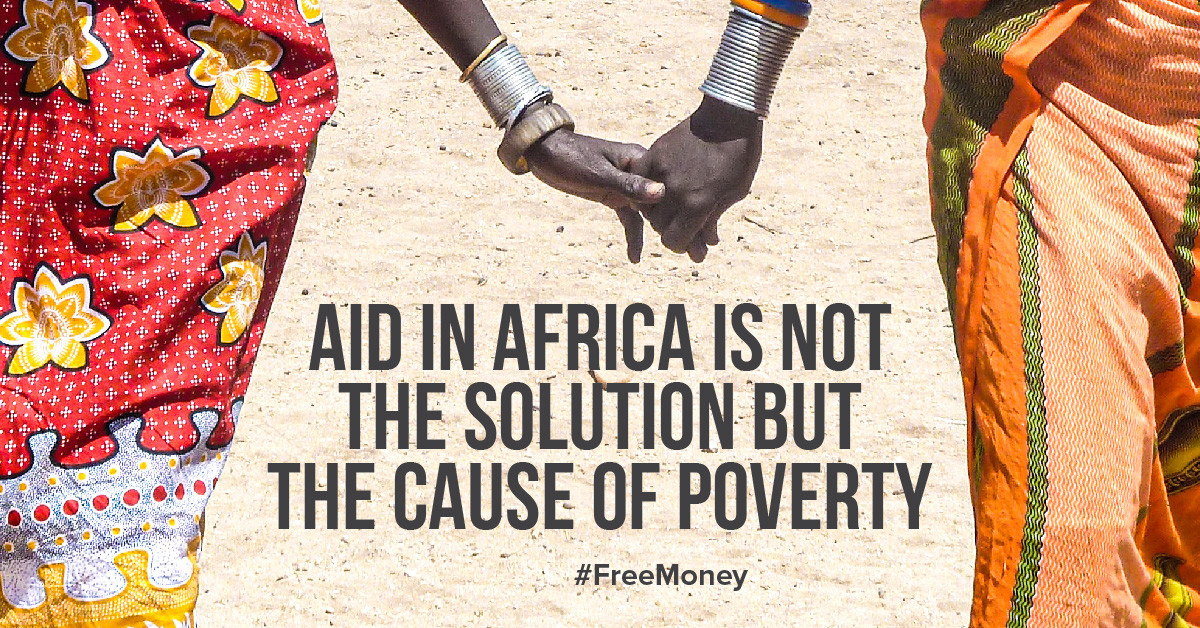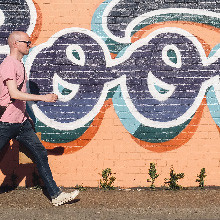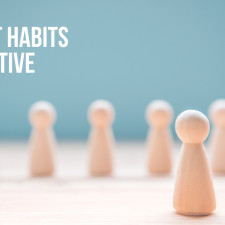Aid in Africa is not the solution but the cause of poverty
More and more economists, journalists, and even former development aid workers tell us that development aid in Africa is not the solution, but the cause of the current misery. One of the first who dared to adopt this somewhat provocative position is Dambisa Moyo. This originally Zimbabwean woman who studied economics in London published her book "Stop with development aid" in 2008.

Clearly and pragmatically, Dambisa substantiates with various facts why aid has not contributed to solving poverty and starvation and has even made the situation in Africa worse. Over the past 70 years, approximately one trillion dollars (1,000,000,000,000,000,000,000,000) has been donated to Africa, and the result is shocking.
In 1970, 10% of Africa lived in poverty, today it is 70% on average, and in some countries, it is higher.
What is going wrong, and why is development aid, as we know it today, not the solution?
The West wrongly determines what is right for developing countries
Dambisa is not alone in her position. Maliha Chishti is a lecturer and researcher at the Pearson Institute for the Study and Resolution of Global Conflicts. She gets publicly angry during performances and publications about Western people who are setting up unjustified and wrong policies and are continually getting away with them.
During a project in Afghanistan, she asked local women what they needed most. After a survey of more than 500 women, it emerged that medical care was the primary need. She then submitted a plan for mobile doctor's posts, taking great care to ensure that it would be possible with a modest budget.
The polite feedback she received on her plan was that she had to re-submit the proposal. The budget could be at least twice as high, but there had to be a human rights component in the next plan. She submitted this plan and was allocated the budget.
Once back in Afghanistan for the roll-out, it turned out that all the other NGOs were doing exactly the same thing. No one had been given a budget to do the local population had been asked for. They only received money when they took over the policy of the Western puppet directors.
Policy errors do not only occur on a large scale, but also on a small scale. The Netherlands is a country with very productive cows. That is why years ago, a Dutch NGO decided to donate several Dutch cows to an Indian community. The community was very grateful to the NGO and decided to take good care of the cows. That is why they took all their daughters from school to look after the cows. There is now a whole generation of young, uneducated women within this Indian community because they did not get what they wanted, but what the NGO thought was right.
Masako Yonekawa did development work in Congo. The refugees he sheltered there slept in simple and basic huts, of which the roof consisted of branches. He decided to provide large plastic covers to make the cabins windy and rainproof. The next day, all the plastic sheeting was stolen by rebels, and the community begged for no more help for fear of being attacked again.
Four forms of development aid
There are four forms of development aid, namely: Economic, Humanitarian, Reform, and Infrastructure. What the opponents of current development aid in Africa agree on is the resistance to development aid from government to government. These are the immense sums of money that one country gives to another.
They are not opposed to private donations or donations from churches, for example, to allow a young woman or man to go to school. They are not against aid for emergencies either. They are concerned with aid that is intended for growth and development, but which has proven not to contribute to it.
If you give a child money for education and once she has successfully completed it, but she can't find a job because the country hasn't achieved growth in any way, you have to ask yourself what goes wrong.
The scorecard of current development aid, particularly in Africa, would not be a viable business. If this were to happen within the business world, then heads would be rolling. Nothing seems to work, and yet everything has already been tried.
Development aid themes over the past 70 years
In the '60s, the main theme for development aid was infrastructure. In the ´70s, it was poverty reduction, and in the ´80s, it was about stabilization and the involvement of private sectors. In the 1990s, the focus was on democracy and governments, and from the year 2000 onwards, there seemed to be no policy at all.
Leaders in developing countries do not take responsibility for their people
A significant problem why development aid does not work is, according to many, that it encourages corruption. Free money makes good leaders bad and bad leaders worse. Besides, the leaders are more concerned with the agenda of their donors than with the agenda of their people.
Abhishek Parajuli did an investigation in Nepal. He had two groups read an almost identical newspaper article. The article was about corruption, but in one article, the corruption was about money that came from aid, and in the other, it was about taxpayers' money. By asking how angry people were about this, and how long the perpetrator has to go to prison, it became clear that it was much worse to steal taxpayers' money.
The corruption of Jacob Zuma
Jacob Zuma was the president of South Africa. When he had his estate built, tens of millions were spent on special security. This money came partly from development aid. The 'free gold' as it was sometimes called.
When during an inspection it appeared that millions of the security budget had been used for the construction of a spacious and luxurious swimming pool, Zuma was able to tell without blushing that it was not a swimming pool, but a firefighting object.
We care the most about what we've earned
Free money is less valuable to mankind than the money that we have had to work hard for. According to researcher Abhishek Parajuli, aid works against human nature. People care most about things they have had to pay for.
In another survey of factory workers who assemble calculators, one group was promised $80 if they achieved a certain level of performance. The second group received $80 in advance, but it would be taken back if they didn't keep the performance. The group that had the chance to lose their $80 was working significantly harder.
The profit model for the West in development aid
Even though development aid is free money for those in power and that there are no achievements attached to it, this does not mean that the West does not benefit from it. For every dollar of aid, in the best-case scenario, only 20% reaches the people for whom it is intended. This is in the very best-case scenario.
Worse yet, some Western countries get between USD 7.00 and USD 10.00 in return through interest, profit, trade, and more. Besides, the West concludes profitable trade agreements that hinder many farmers and entrepreneurs in free trade. The loss of income is so significant that many countries could have been self-sufficient long ago with this fortune.
Is a complete halt to government development aid the solution?
According to Dambisa, the solution is not to stop all development aid immediately. She has been arguing for a phased 5-year plan for 10 years. The only ones to suffer from this are the leaders who, in the worst-case scenario, have to give up their big bank account in Geneva.
The advantage of stopping development aid is that the leader has to spend their free time and work hard to serve the people they represent.
Other victims are the many NGOs that live and grow from the donations. There too, Dambisa and many others do not see a problem. Most NGOs are based on a model of pity. As if Africa and its inhabitants can do nothing themselves. They are, therefore, not a solution but a cause of the problem.
The alternative for aid in Africa
By cutting short term aid as we know it at this moment, the current leaders are forced to focus on the future. The free money is no longer a certainty, and they will be held responsible by their people.
Some of the things that the leaders of Africa will have to do are:
- Learning to get good financial ratings
- Learning to pitch with foreign investors
- Focus on trading with other countries
- Embracing micro-financing
- Encouraging entrepreneurship
If we turn off the money tap, the leaders will realize that it is not a given fact to get another bag of money next year. They will learn that if you don't keep your promises, there will be no progress.
Why do we keep doing what we do?
There is a big problem why we "must" continue to do what we do in the field of development aid, and that is the financial rating of Western donors. All the money that has been borrowed must ever be paid back. The agreement now is often that as long as interest is paid, nothing has to be paid back.
As long as the interest is paid, the loan retains its value. If that doesn't work, then additional loans are used to pay the interest again, and the country doesn't have to write off its value. If a country would (have to) do that depreciation, then the financial rating of the country decreases, with all the consequences that entail.
The Zimbabwean dictator Mugabe once received several billion in development aid. When he channeled this directly to his "secret" private account, the West was, of course, furious. But when he told that he did not intend to pay interest, he was immediately paid the same amount again to use it for what it was meant to be used for and thus also to meet his interest obligation.
Conclusion: If each country would stop donating more than 100 trillion in total and write off their debt, Africa would become economically healthy again, but some western countries would go bankrupt with immediate effect.
It does not matter, therefore, that after 80 years of aid, Africa is in a worse economic and social situation than it was when we started with it. We know that it does not work, but we must continue with it. Otherwise, the wealthy West will suddenly no longer be that rich.
-
Wassili ZafirisCoaching, TrainingUS$ 3,81 pm
-
Frits van NoortwijkLeadershipscoachUS$ 1,43 pm
-
Ana Luísa MonteiroLeadership coachUS$ 1,18 pm
-
Ben SteenstraCo-founder of TheONEUS$ 3,54 pm
-
Francisco ReisLearning & DevelopUS$ 0,59 pm
-
Kali MincyChanging LivesUS$ 0,98 pm















